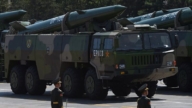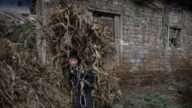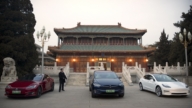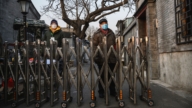【新唐人2013年11月01日訊】中共十八屆三中全會將在11月9號召開,北京「清華大學」官方網站披露,中共前總理朱鎔基和中紀委書記王岐山等人,日前會見了「清華經管學院」顧問委員會委員,陪同朱鎔基的包括多位改革派財經高官。分析認為,朱鎔基的高調露面,可能與三中全會有關「深化改革」的議題規劃有所關聯。
29號,中共政治局宣佈三中全會將於11月9號至12號召開,將審議通過《中共中央關於全面深化改革若干重大問題的決定》。這是中共領導人習近平、李克強上臺後的第一次重要會議,也是確定習李新政府未來經濟發展方針的重要平臺。
23號,中共前總理朱鎔基,高調會見北京「清華大學經濟管理學院」顧問委員會委員。
陪同朱鎔基出席的「超級陣容」,包括中紀委書記王岐山、國務院副總理劉延東、馬凱,以及央行行長周小川、財政部長樓繼偉、中共財經領導小組辦公室主任劉鶴、中信集團董事長常振明、和阿里巴巴集團執行主席馬雲等人。主要是朱鎔基昔日舊部,以及習、李陣營經濟改革的班底。
朱鎔基曾是中共經濟改革的主導者。
朱鎔基8月推出新書之後,這是他第二次的公開露面。在中共三中全會即將召開的前夕,朱鎔基再度公開露面,引發輿論關注。
旅美原大陸史學教授劉因全:「我認為朱鎔基這一次露面與改革是有關係的,我們知道朱鎔基是著名的改革派代表人物之一,0他這次露面而且高調露面,我相信是與三中全會有關的,我相信三中全會在經濟方面,又會提出一些改革重大的措施。」
不過,批評人士指出,朱鎔基在位時倡導的經濟改革給中國的「天價」樓市、地方政府的強徵強拆等社會問題埋下禍根,包括90代國企大改制引發的大規模下崗,以及他推行的醫療改革、教育體制改革等,因產業化的方向性錯誤而失敗。
時政評論員汪北稷:「朱鎔基在任的時候,也僅僅是在經濟裏面做了一些對中共國家利益、中央集權有利的經濟改革,改革之後的結果是中國依然是環境惡化,貧富懸殊,官民對立,腐敗氾濫。」
特別是近兩年,中國樓市泡沫、地方債危機以及資金外逃等愈演愈烈,許多專家預警中國將爆發經濟危機,經濟改革已是習、李政權當務之急。
香港《明報》評論說,朱鎔基的高調亮相,難免令人有「內地經改、捨朱家軍其誰」的聯想。因為,王岐山、馬凱、周小川、樓繼偉和李榮融等人,都是朱總當年的得力幹將,名副其實的「朱家軍」成員,劉鶴又是這次三中全會經濟改革文件的操刀手。
朱鎔基曾在上任之初發下豪語,他說:「我這裏準備了一百口棺材,九十九口留給貪官,一口留給我自己。」
但是朱鎔基在任時,對於建立反貪制度不但沒有貢獻,他的愛將王雪冰、朱小華等卻因為貪腐而被判刑。他在金融界任職的子女,也一直被海外媒體批評為「撈錢」的太子黨。
旅美原大陸史學教授劉因全指出,壟斷中國社會資源的中共既得利益集團,不會允許中共政權進行任何改革,在一黨專制下,無論是朱鎔基還是前領導人溫家寶想搞政改,必會遭到既得利益集團的強烈抵制。
劉因全:「在抵制和反對過程中就會走樣,就像朱鎔基在臺上的時候進行了工廠改制、國營企業改制,但是最後改下去,中共的一些官員趁著改革的機會,他們以改革的名義,把國有企業變成了他們自己的企業。」
時政評論員汪北稷指出,中共如果不進行政治體制改革,不肯放開權力,還權力給人民,三中全會仍走不出中共歷史的怪圈,中共會走入更大的腐敗來橫徵暴斂、壓榨國民。
採訪編輯/李韻 後製/李勇
Observers Speculate over Zhu Rongji’s Latest Public Appearance
The Third Plenary Session of the 18th Chinese Communist
Party (CCP) is scheduled for November 9.
Tsinghua University website posted that Zhu Rongji,
former Premier, and Wang Qishan, secretary of the Central
Commission for Discipline Inspection, met with advisory
board members of Tsinghua University
School of Economics and Management (SEM).
Zhu was accompanied by other reformists’ financial officials.
Analysts say that Zhu’s high-profile appearance likely
connects with the “deepened reform" agenda at the upcoming CCP meeting.
On October 29, the CCP officially announced that the Third
Plenary Session will be held between November 9 and 12.
The meeting will discuss major issues concerning overall
and deepened reforms.
This is the first key meeting since Xi Jinping
and Li Keqiang (Xi-Li) took office.
The meeting will confirm Xi-Li’s future economic
development policy.
On Oct. 23, in a high-profile fashion, Zhu Rongji met with
advisory board members of Tsinghua SEM.
Zhou was accompanied by Wang Qishan, deputy Premier
Liu Yandong and Ma Kai, central bank governor
Zhou Xiaochuan, Minister of Finance Liu Jiwei,
heads of Financial and Economic Leading Group Liu He,
Chairman of CITIC Group Chang Zhenming,
and Executive Chairman of Alibaba Group Jack Ma.
They are mainly Zhu’s old subordinates
and reformists of Xi-Li administration.
Zhu was a herald of economic reform in China.
Since Zhu’s new book was published in August,
this is his second public appearance.
Because it is right before the Third Plenary Session,
his appearance has drawn public attention.
Liu Yinquan, US-based Professor of Chinese history:
“I think Zhu showing up in public is related to the reform.
As we know, Zhu is one
of the well-known pioneer reformists.
This time he turned up in a high-profile way,
I think it is associated with the Third Plenary Session.
The Third Plenary Session will initiate key measures
of economic reform."
However, critics argue that in Zhu’s tenure, he advocated
economic reform, causing later social problems
such as sky-high property prices and local regimes’
forcible demolition.
Also a large-scale lay off of workers during state-owned
company reform in 1990s, and healthcare as well
as educational system reform caused failure due
to the industrialization of the direction mistakes.
Wang Beiji, current affairs commentator: “In Zhu’s tenure,
he initiated economic reform favorable to
the CCP state interests and centralized power.
After the reform, China’s environment still deteriorated,
and the gap wealth widened.
The collision between officials and civilians intensified,
corruption is rampant."
Particularly over the last two years, the real estate bubble,
the local debt crisis, and capital out flowing are worsening.
Many experts speculate that China’s economic crisis will
burst, thus economic reform is the first priority for
the Xi-Li administration.
Hong Kong’s Ming Pao says that Zhu’s high-profile
appearance makes people think that nobody will push
Mainland China’s reform except “Zhu’s family.”
Wang Qishan, Ma Kai, Zhou Xiaochuan, Liu Jiwei
and Li Rongrong are Zhu’s old subordinates,
they are veritable “family members of Zhu."
Liu He is the key writer of the economic reform document
for the Third Plenary Session.
Zhu has vowed in the past when he took office that he would,
“have 100 coffins prepared.
Ninety-nine are for corrupt officials
and the last one is for myself."
Zhu’s anti-corruption system didn’t achieve the goal,
instead his allies Wang Xuebing and Zhu Xiaohua were sent
to jail on corruption accusations.
His children working in the financial sectors have been
criticized by overseas media as princelings of “money making."
Liu Yingquan says that the CCP interest groups that
monopolize the Chinese social resources will not allow
the Chinese regime’s reform to take place.
Under the one-Party dictatorship, whether it is Zhu Rongji
or Wen Jiabao who want to carry out political reform,
they are bound to face strong resistance
from the interest groups.
Liu: “During the resistance and opposition, the reform will
change its initial purpose.
For example, Zhu carried out state-owned company reform.
In the end, the CCP officials took advantage of the reform,
changing state-owned enterprises into their own."
Wang Beiji says if the CCP doesn’t implement
political reform, easing its power and returning the power
to the people, the Third Plenary Session still can’t get rid
of its cycle of CCP’s dictatorship.
The CCP will continue to use more corruption
to seize the wealth and persecute Chinese people.




























